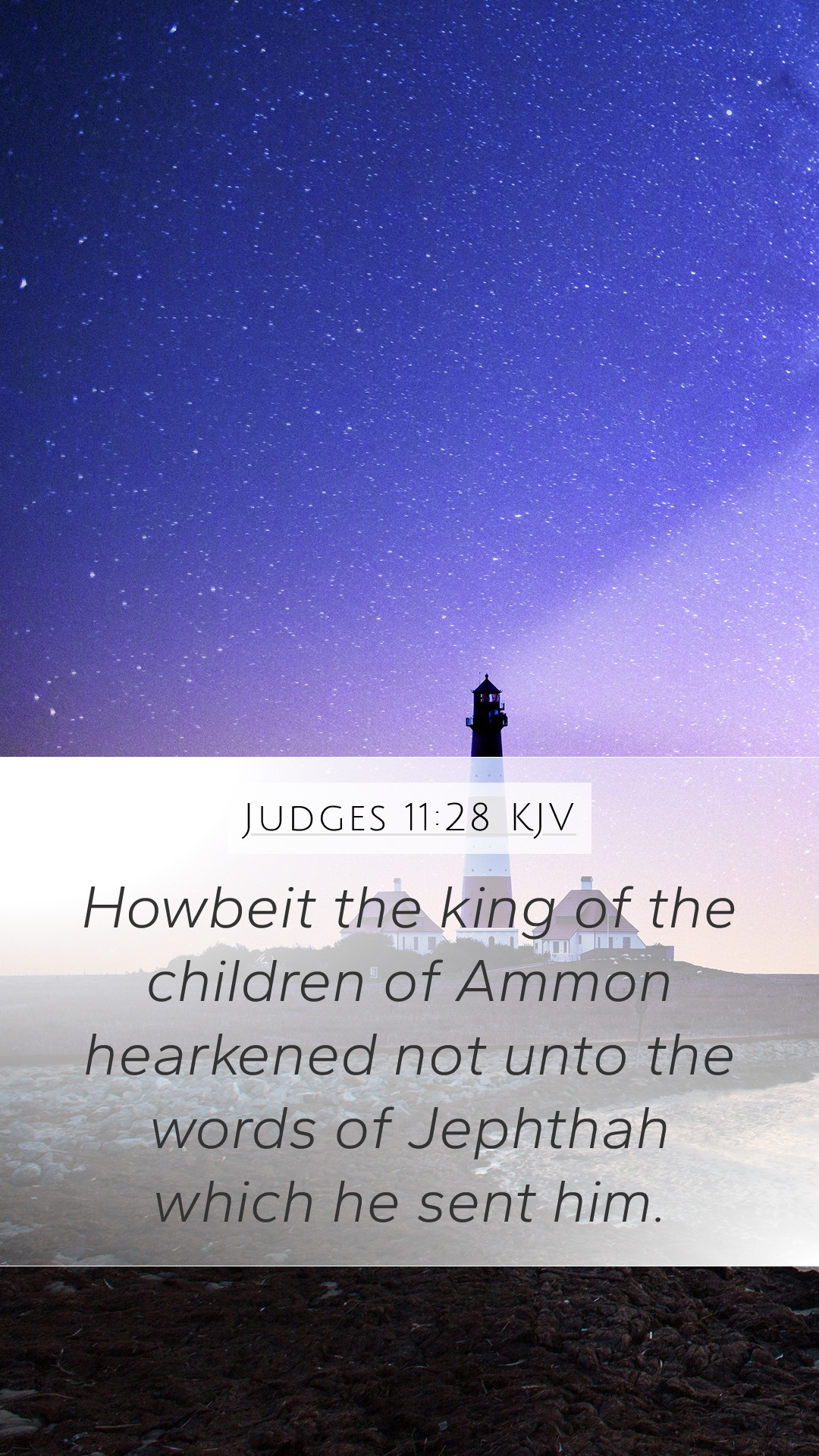Bible Verse Commentary on Judges 11:28
Judges 11:28 states:
"But the king of the children of Ammon hearkened not unto the word of Jephthah which he sent him."
Overview
This verse highlights a crucial moment in the narrative of Jephthah, a judge of Israel, and his interaction with the Ammonites. The gravity of the situation lies in Jephthah’s attempts to resolve conflict through negotiation, which ultimately fails. This failure not only sets the stage for subsequent events but also reflects on themes of leadership, communication, and divine providence.
Bible Verse Meanings
In this verse, we see Jephthah reaching out to the king of the Ammonites with a message attempting to avert war. The king’s refusal to listen serves as a critical turning point. Understanding this refusal requires examining the relationship between the two nations and the historical context that fuels their animosity.
Insights from Public Domain Commentaries
Matthew Henry's Commentary
According to Matthew Henry, this verse signifies the disregard for the counsel given by Jephthah. Henry emphasizes that the king's refusal reveals a stubbornness to recognize truth and reason, which leads to destruction. This commentary underlines the importance of heeding wise counsel and the consequences of ignoring it.
Albert Barnes' Notes on the Bible
Albert Barnes provides further context by discussing the role of communication in peacekeeping. He suggests that Jephthah’s message was reasonable and pointed out the injustices faced by Israel, yet the suspicions and pride of the Ammonite king blinded him to the possibility of reconciliation. Barnes also highlights that this narrative serves as a critique of leadership that prioritizes pride over peacemaking.
Adam Clarke's Commentary
Adam Clarke elaborates on the socio-political dynamics between Israel and Ammon. He discusses the historical grievances that fuel the conflict, painting a picture of deep-rooted enmity. Clarke's analysis indicates that such conflicts often stem from misconceptions and past injustices, thereby educating readers on the significance of historical context in understanding Scripture.
Application of Judges 11:28
The refusal of the Ammonite king can be interpreted on a personal level as a lesson about communication and the importance of being open to dialogue. In our daily lives, whether in community, family, or professional relationships, the arrogance of not listening to others can lead to misunderstandings and conflict.
Biblical Exegesis
Examining this verse helps uncover the theme of divine sovereignty at play in human affairs. Despite Jephthah's best efforts to negotiate, the outcome was predetermined, illustrating that God's plans often unfold despite human decisions. This aspect can lead to deeper Bible study insights about God's control over history.
Related Bible Cross References
- Judges 10:9 - Background on the oppression of Israel by Ammon.
- Judges 11:1-11 - The backstory of Jephthah, his calling, and initial gathering of support.
- 1 Samuel 8:7 - Illustrates the theme of leadership and listening to God versus man.
Further Study and Reflection
For those engaged in Bible study groups or online Bible study, exploring the tensions between Jephthah and the Ammonite king can offer valuable lessons on the importance of humility and the consequences of conflict. Engaging with Bible study tools and Bible study resources can enhance understanding of these interactions.
Conclusion
In summary, Judges 11:28 presents an opportunity for readers to reflect on the significance of open communication, the importance of listening, and the divine providence that guides the affairs of nations and individuals alike. This commentary combines the insights of various respected biblical scholars to enhance the understanding of this complex passage.


